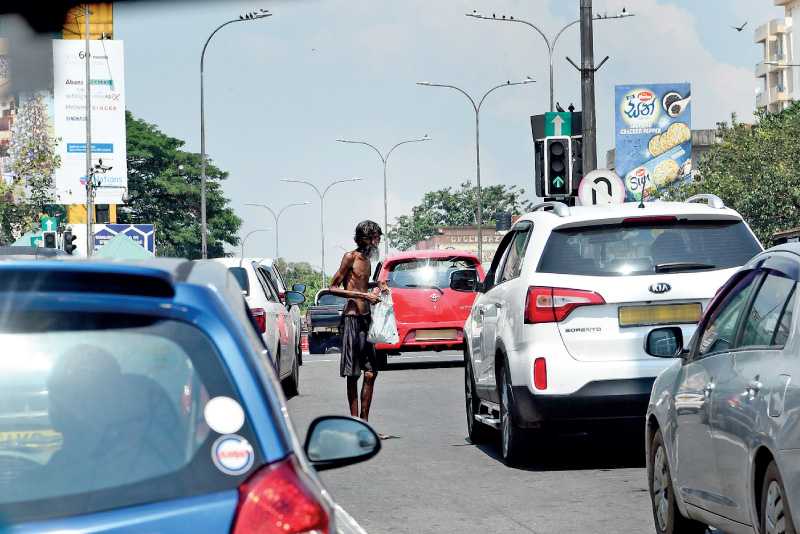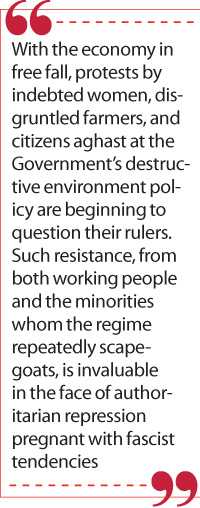Thursday Feb 19, 2026
Thursday Feb 19, 2026
Thursday, 1 April 2021 00:08 - - {{hitsCtrl.values.hits}}

Underneath the heightened rhetoric in Sri Lanka about Geneva in recent weeks is a devastating economic crisis that has been ravaging the everyday lives of the people – Pic by Shehan Gunasekara
By Ahilan Kadirgamar
The Hindu: The United Nations Human Rights Council (UNHRC) in Geneva has passed another resolution on Sri Lanka, as war-time accountability continues to haunt the state for over a decade. Sri Lanka’s prospects in Geneva swing according to geopolitical interests at any given time — reflecting a vote this time with 22 in favour, 11 against and 14 abstaining. Yet, Sri Lanka could not have tried harder to shoot itself in the foot by repressing minorities domestically and actively alienating external powers.
In 2015, a resolution was co-sponsored by Sri Lanka and unanimously adopted with overwhelming international support. Indeed, Sri Lanka in the following years was even considered an exception by some for its attempts at reconciliation when the world at large was getting increasingly polarised, as Brexit and the rise of Donald Trump would show us. However, instead of building on that experience, the Rajapaksa government withdrew from that resolution, soon after rising to power, in a show of unilateral arrogance.
Meanwhile, Sri Lanka’s increasing economic dependence on China has offended India and many Western countries, with the latter pushing for greater scrutiny of the deteriorating human rights situation. The Tamil and Muslim minorities have also turned to Geneva as the space to engage the government has shrunk with growing authoritarian rule.
As geopolitical rivalries exacerbate external relations, what will come of the recent moves in Geneva for the long-suffering people, and particularly the minority communities under constant attack by the State and its majoritarian allies?
 Mounting Islamophobia
Mounting Islamophobia
The tremendous physical destruction, economic setbacks and the abominable loss of human life and suffering of Tamils during the protracted war have not got the necessary reckoning within the country. Rather, the nationalists across the ethnic divide play with heightened rhetoric of “war heroes” and “war victims” as sound bites for international consumption. Year after year, in the lead up to and during the sessions in Geneva, the Sinhala and Tamil nationalists either claim to save war heroes from international prosecution or find justice for war victims.
Replaying the rhetoric of the war and its legacy has been paralleled by mounting Islamophobic attacks over the last decade. The Easter terror attacks in April 2019 by an Islamist radical group and the backlash that followed, including violent attacks on Muslims, culminated in the election of President Gotabaya Rajapaksa in November that year. While the minorities voted overwhelmingly against Rajapaksa, a tremendous swing in the Sinhala constituencies ensured his thumping victory.
During the Parliamentary Elections in August 2020, the minorities were subdued as fear had eclipsed the communities, and the minority vote was fragmented, with some even supporting coalition partners of the majoritarian regime. The rulers consolidated further power by passing the 20th Amendment, with a comfortable two-thirds in Parliament, and giving unfettered powers to the
executive.
The regime’s show of force soon after was apparent in blatantly discriminatory measures such as the forced cremation of COVID-19 victims, which was a blow to Muslims’ burial rights. However, heaping power has not translated to clear or coherent policymaking as evident from the Government’s thoughtless economic policies, the awful dilly-dallying before permitting burials of pandemic victims and more recently with the burqa ban proposal. The all-powerful Government may have the numbers in the Legislature but stands exposed for its instability and weakness.
Economic woes
Underneath the heightened rhetoric in Sri Lanka about Geneva in recent weeks is a devastating economic crisis that has been ravaging the everyday lives of the people. Sri Lanka’s woes are a consequence of liberalising trade and capital flows over four decades ago. Its dependence on imports, and looming external debt payments, both without adequate foreign earnings, have pushed the economy over the cliff into a depression.
Keeping Sri Lanka at boiling point, particularly with talk of external and internal enemies, has been one strategy to deflect the people’s attention from their economic distress. Those in power forget how the citizenry has time and again galvanised resistance when bread and butter concerns hit the roof. Furthermore, time is ticking, where the country is for the first time in danger of defaulting on its external debt, even as the grandstanding chauvinist ideologues in Government are in denial.
In this context, with escalating attacks on the land rights of minorities, an unprecedented protest march from Pottuvil in the south-east to Polihandy in the north mobilised sections of the minorities in early February. The Tamil nationalist mobilisation was joined by Muslim communities in the east, and drew support from up-country Tamils centred in the plantations. This six-day-long march amidst the COVID-19 situation reflected the desperation of the minority
communities.
The organisation of the march and its conclusion have triggered questions about its inclusivity and the attempts by hard-line Tamil diaspora groups to hijack it. But it has also compelled many to reflect on how and why minorities should forge an alliance. Furthermore, can such an alliance include sections of the Sinhala community to redirect the country on a plural and democratic path? Or will this initiative also end as mere theatrics for consumption in Geneva?
Tragic history
Sri Lanka’s tragic political history is in many ways a consequence of the failures of its political elite, and their rank opportunism and nationalist world view. They could have negotiated a solution long before Sri Lanka got embroiled in armed conflict. International engagement and solutions have only aggravated national crisis from the time of the Indian Peace Keeping debacle in the late 1980s to the failed Norwegian peace process of mid-2000s that eventually led to the cataclysmic end
of the war in 2009.
Moreover, the golden opportunity soon after the war to address the ethnic problem was squandered by the Rajapaksa regime due to its hubris, and eventually paid with regime change in 2015. The current Rajapaksa leadership and its core base are again polarising Sri Lanka, undermining possibilities for a plural and democratic future for the country.
In this context, India’s vote at the Council was closely watched, given New Delhi’s frustration with Colombo, particularly after it reneged on the East Container Terminal project at the Colombo Port, and the impending Tamil Nadu elections. India abstaining on the resolution was considered a betrayal by the narrow Tamil nationalist lobby, whose nonsensical campaign seeks to move Sri Lanka’s justice question from Geneva to the International Criminal Court.
Nevertheless, India in its oral intervention did insist that Provincial Council elections should be held and openly expressed its “support to the Tamils of Sri Lanka for equality, justice, dignity and peace.” Sadly, India under the Modi regime can neither claim to be a beacon of devolution as it undermines the powers of its own States nor does it have the credibility to call out Sri Lanka on Muslim rights, given its own despicable attacks on Muslims.
The resolution has been forthright in highlighting the ongoing human rights abuses and places the spotlight on the state of democracy in Sri Lanka. With the economy in free fall, protests by indebted women, disgruntled farmers, and citizens aghast at the Government’s destructive environment policy are beginning to question their rulers. Such resistance, from both working people and the minorities whom the regime repeatedly scapegoats, is invaluable in the face of authoritarian repression pregnant with fascist tendencies. It is democratic struggle within Sri Lanka, rather than advocacy in Geneva, that will put an end to this dangerous trajectory of polarisation and dispossession.
(Source: https://www.thehindu.com/opinion/lead/polarisation-in-times-of-dispossession/article34192138.ece?homepage=true)
Ahilan Kadirgamar is a political economist and Senior Lecturer, University of Jaffna